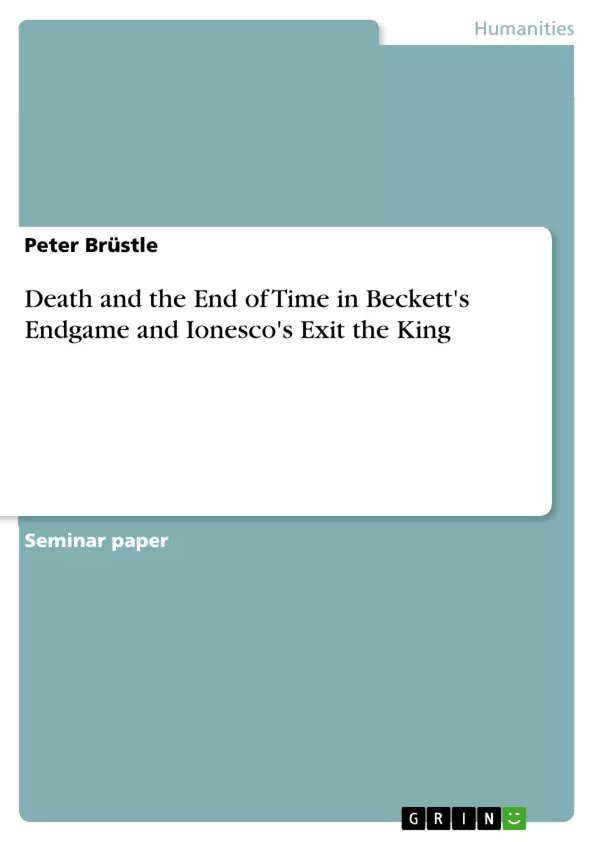Endgame (Fin de Partie) and Exit the King (Le Roi se Meurt) - two plays about fallen kings trapped at the end of time and unable to give meaning to existence. While Hamm and Clov are desperately waiting for death as the only way out of an eternal cycle of routine, King Bérenger has ‘an hour and a half’ left to let go of life and learn to accept mortality. Confronted with a world that is slowly fading into silence and ‘immateriality’, both Hamm, Clov and Bérenger become aware of the absurdity of life and have to face the impossibility to give meaning to existence. Both Beckett and Ionesco make use of similar devices to describe this dilemma, yet the two plays raise different questions about being and offer different solutions - if at all.
Inhaltsverzeichnis (Table of Contents)
- Introduction
- 1. Life at its final stage
- 2. Human relationships
- 3. A play signifying nothing?
Zielsetzung und Themenschwerpunkte (Objectives and Key Themes)
This essay explores the themes of mortality, meaninglessness, and the human condition in Samuel Beckett's Endgame and Eugène Ionesco's Exit the King. The author analyzes how both plays use similar theatrical devices to portray the absurdity of life and the impossibility of finding meaning in a world seemingly devoid of purpose.
- The depiction of life at its final stage as a metaphor for the end of the material world
- The exploration of human relationships in the face of mortality
- The questioning of meaning and purpose in a world that seems to have lost its significance
- The exploration of the cyclical nature of existence and the futility of hope
- The examination of the different ways that Beckett and Ionesco approach these themes
Zusammenfassung der Kapitel (Chapter Summaries)
- Introduction: The introduction sets the stage for the essay, introducing the two plays and their central themes: the end of time, the futility of existence, and the struggle to find meaning in a world that seems to have lost its purpose.
- 1. Life at its final stage: This chapter focuses on the metaphor of life coming to an end and the vanishing of the material world. The setting of Endgame is described as a bleak and desolate space, symbolizing the death of the outside world. The characters are physically and mentally incapacitated, trapped in a cycle of routine and despair. The author contrasts this with the setting of Exit the King, where the king's world is slowly crumbling and falling apart, yet there is a sense that the king still has some agency in his own death.
Schlüsselwörter (Keywords)
The key themes explored in this essay include mortality, meaninglessness, the absurd, human relationships, the end of time, and postmodernism. The author draws on the works of Samuel Beckett, Eugène Ionesco, Theodor W. Adorno, and Michael Ende to illustrate these concepts, examining the ways in which the two plays reflect the anxieties and existential questions of the post-World War II era.
Frequently Asked Questions
What are the main themes in Beckett's "Endgame"?
The play explores the futility of existence, the cyclical nature of routine, and the desperate wait for death in a world that has lost its meaning.
How does Ionesco's "Exit the King" depict mortality?
It portrays King Bérenger's struggle to accept his imminent death as his kingdom literally crumbles around him, symbolizing the fading of the material world.
What is the "End of Time" in these plays?
It is a metaphor for a world devoid of purpose, where time no longer moves forward toward progress but remains trapped in an absurd present.
What are the similarities between Hamm and King Bérenger?
Both are "fallen kings" trapped in their respective environments, unable to find meaning in their existence while facing the inevitable end.
How do Beckett and Ionesco differ in their solutions to the absurd?
While both highlight the absurdity of life, they offer different perspectives on acceptance and the impossibility of finding a definitive purpose.
- Quote paper
- Peter Brüstle (Author), 2003, Death and the End of Time in Beckett's Endgame and Ionesco's Exit the King, Munich, GRIN Verlag, https://www.grin.com/document/32594



